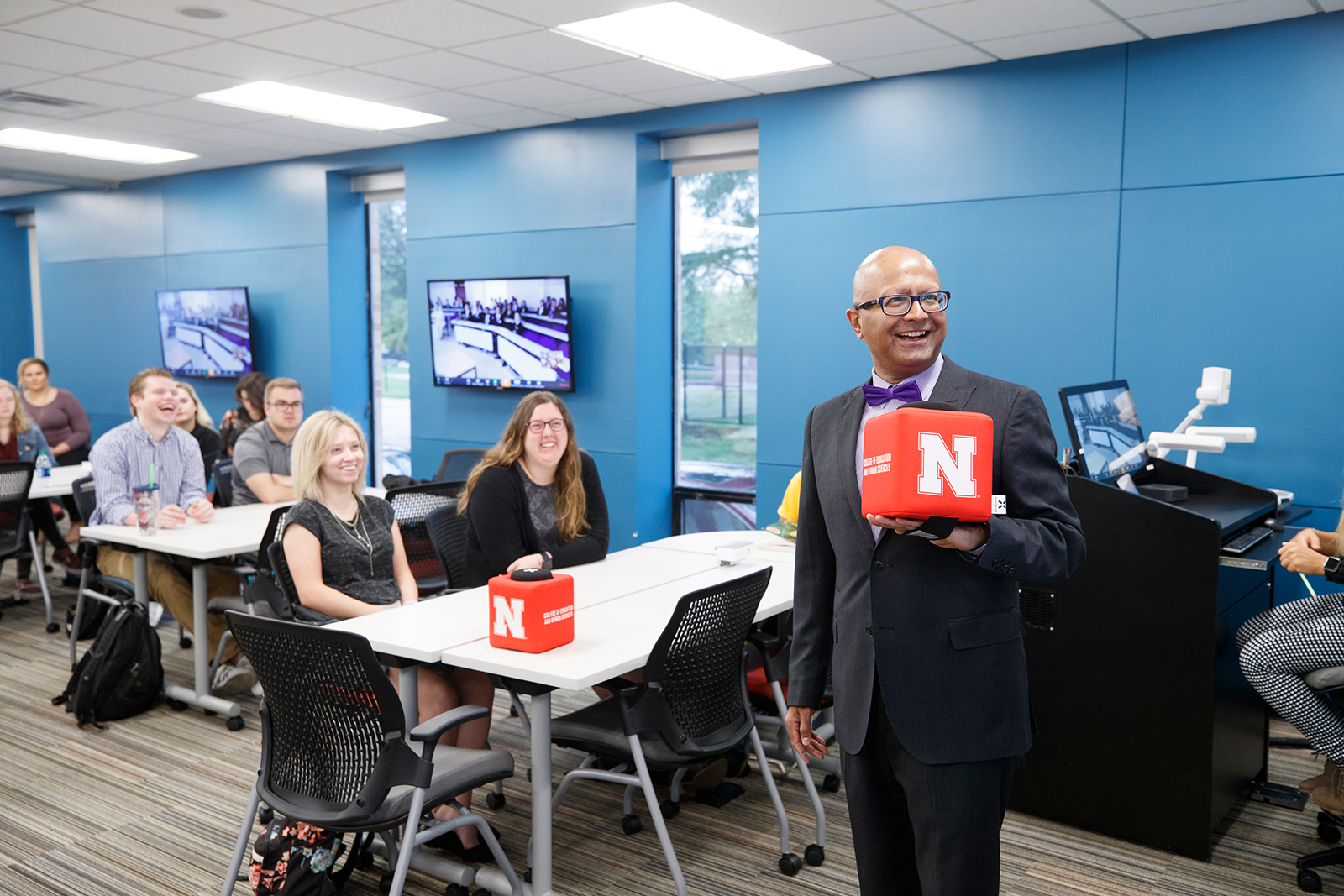
Three Countries; One Classroom: Opens Doors, Connects Minds
13 Dec 2018
College of Education and Human Sciences (CEHS) faculty member Dipra Jha bridged a distance of 7,500 miles and a 9-hour time difference this fall with a new kind of course. University of Nebraska-Lincoln (UNL) students in Jha’s “Introduction to the Lodging Industry” course connected with peers at The Emirates Academy of Hospitality Management in Dubai, United Arab Emirates and Oman Tourism College in Muscat, Oman through synchronous virtual exchange sessions and asynchronous activities.
The course was part of the UNL Global Virtual Project supported by the Stevens Initiative, which is sponsored by the U.S. Department of State and administered by the Aspen Institute. The project, launched at the beginning of the spring 2018 semester, provided students with cross-cultural learning experiences and peer to peer engagement in order to encourage student acquisition of global competencies.
“Three Countries; One Classroom” provided an opportunity for Nebraska students to directly engage with peers and industry experts in Oman and the United Arab Emirates through collaborative online international learning (COIL) sessions. In addition to learning about the lodging and hospitality industries in these locations, students learned from and learned about each other during the course of the semester.
The course was supported through a CEHS Technology Innovation Grant which enabled Jha to integrate Catchbox throwable microphones into the classroom experience and resulted in higher student engagement. Matthew Kutscher, academic technology specialist and Philippe Siassia, technology support associate from the CEHS Information Technology team provided technical expertise so Jha could deliver the course successfully.
"I have never been more eager to participate in a voluntary presentation until we learned about the COIL project,” said Lindsey Turner, a junior from Crete, Nebraska.
Turner was part of a six-member peer teaching team that presented on the tourism and hospitality industries in Nebraska. Tourism is Nebraska's third largest external revenue source after agriculture and manufacturing, bringing in an excess of $4.9 billion annually and supporting more than 47,400 jobs. According to the U.S. Travel Association, tax revenues generated by domestic and international travelers in Nebraska totaled over $731.5 million in 2016. Turner’s team also answered questions from their international counterparts about recreational activities unique to the state, such as “tanking.”
“Having never been outside of the U.S. before, I have only learned about other cultures through my own research or textbooks, but the COIL project fostered conversation that benefited everyone participating. Zoom-conferencing with students from different parts of the world has opened my eyes to the opportunities and cultural similarities/differences that I couldn't have learned from textbooks,” added Turner.
Assessment for the course was undertaken by the Nebraska Public Policy Center. Jha also invited other faculty and administrators to observe the COIL sessions and provide feedback.
“Professor Jha has created a very effective teaching and learning environment for his students at UNL and in other countries through collaborative online international learning,” said Mary Ann Johnson, chair of the nutrition and health sciences department, after observing one of the synchronous sessions. “This course demonstrates how this method of virtual exchange can lead to a high level of engagement among students. The department is excited to support such innovation in teaching and learning.”
Based on positive feedback from students and overseas partner institutions, Jha plans to expand the course next fall to include universities from the Netherlands and the United Kingdom, in addition to existing partner institutions in the Middle East.
“Introduction to the Lodging Industry” is offered as part of the hospitality, restaurant and tourism management (HRTM) major. HRTM is one of the fastest growing majors at the University of Nebraska-Lincoln, residing jointly in the College of Education and Human Sciences (CEHS) and the College of Agricultural Sciences and Natural Resources (CASNR). Students can also choose an emphasis within the major, including: club management, event planning, food and beverage, human resources, lodging and tourism.
The “Three Countries; One Classroom” project was part of the larger UNL Global Virtual Project supported by the Stevens Initiative, which is sponsored by the U.S. Department of State and administered by the Aspen Institute. Additional funding is provided by the Bezos Family Foundation and the governments of Morocco and the United Arab Emirates. The Stevens Initiative is an international effort to build global competence and career readiness for young people in the United States and the Middle East and North Africa while growing and enhancing the field of virtual exchange: online, international, and collaborative learning.
College of Education and Human Sciences